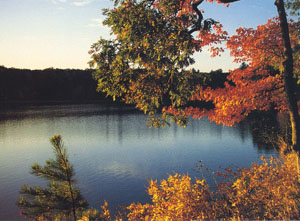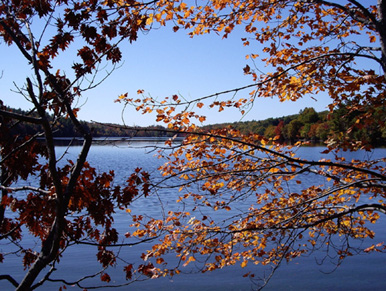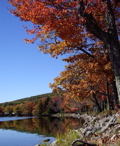
On July 4th 1845, Henry David Thoreau declared his independence and went to Walden pond, of that experience he said "I came here to live."

Henry David Thoreau and 19th Century Natural Science
![]()
Thoreau is amazed by the natural world & the boundaries between the two cultures [arts & sciences] was considerably less then for him – than [ it is ] now.
Concord Town Hall, Thoreau's native soil.
The question arises “How do we know the natural world?”
15-17
difference between truth and facts was a tacit assumption of University education in 1830s
![]()
Thoreau and others rejected atomism, mechanism, corpuscularianism and “narrow reasonability of the rational empiricist tradition (Descartes, Newton, Locke, Hume) because it was associated with the blindness of the enlightenment and the excesses of the French Revolution's Thermidorean reaction and subsequent widespread popularity laissez faire attitudes of nationalists in America and overseas.
He rejected Paley’s ideas that had been published in Natural Theology.
Goethe & Humboldt were sources of a new inspiration based on Herder and Buffon the naturalists of the 18th century concerning the specialness and the developmental qualities of life on earth.
A journal entry dated 20 November 1857 suggests something of the character of this intimacy:
"If a man is rich and strong anywhere, it must be on his native soil.
Here I have been these forty years learning the language of these fields that I may better express myself. If I should travel to the prairies, I should much less understand them, and my past life would serve me but ill to describe them. many a weed here stands for more life to me than the big trees of California would should I go there."
Thus it is that, at age twenty-two, Thoreau is assuring us that:
Nature will bear the closest inspection. She invites us to lay our eye level with her smallest leaf, and take an insect view of its plain.
(Journal, 22 October 1839)
And nearly twenty years later, when informing us of the degree to which we must rely on our own resources, he writes:
You must prevail of your own force, as a plant springs and grows by its own vitality.
(Journal, 3 April 1858)
WALLS insists: he’s not a misanthropic hermit; instead he’s an engaged visionary of a new science of ecological relationships among land, vegetation, animals and humankind.
"Once I was part and parcel of Nature; now I am observant of her"
(April 2, 1852, Journal);
"One studies the books of science merely to learn the language of
naturalists, -- to be able to communicate with them"
(March 23, 1853, Journal).
![]()
1 Facts and Truth Nominalists, Realists, Idealists, Romantics, Naturalists
Natural History before Walden
2 The Empire of thought Law as Logos
Organic Machine
Emergent Laws
Rational Holism vs. Empirical Holism
3 Seeing New Worlds Alexander Von Humboldt and Walden
Old Worlds and New
4 Cosmos Knowing as Worlding
Thoreau as Humboldtian
“Epistemology of contact”
Writing the Cosmos: Walden
5 A Plurality of Worlds Intentions of the Eye
Worlds without End: The Dispersion of Seeds
Thoreau’s Ironic Science
6 Walking the Holy Land Contingent Wholes
Chance and Necessity
Walking or the Wild
Disciplining Thoreau (elusive boundaries)
![]()
“counting tree rings, listing plant species, measuring stream depths.”
3.
“unroll the rotten papyrus on which the history of Concord forest is written.”
fragments–facts do not always make truth–distinctions between pieces & whole!
Facts have imagined boundaries
fiction is not nonfiction
truth may be a whole process what if we are only part of the process, or still within the process?
Reading nature the common medium is of necessity language - or “different languages”
9.
“visible modes of reality that otherwise went unseen” sci & lit the same language ?
“more or less a stable construction.”
p. 10.
situated knowledges: sited in -- discipline, place, history, gender, personality.
Donna Harraway
WE TOO
“Thoreau was faced with the problem of inhabiting both the local an the global.... between history and myth --- without sacrificing either extreme.”
10.
“sight that is answerable to what it sees.”
10.
“The only way to find a larger vision is to be somewhere in the particular.” Haraway
10.
“This common feature of 19th century thought was systematized and theorized by William Whewell, who named it ‘consilience’: the advancement of knowledge that occurs when apparently unconnected classes of facts are seen to have ‘jumped together’ to form a new, simpler, and more unified theory.”
11.
the facts “but seen I a new point of view.”
“integration of knowledge into a new, coherent entity, . . . a new synthesis.”
“grasp the total dynamics of reality as a whole.”
Erich Jantsch, 11.
consilience of Emersonian transcendental wholes with Humboldtian empirical science
11
| authors | Emerson | Humboldt |
| concepts | Oversoul | Zonation |
| meaning | Rays of relation | altitudinal plant zones |
| compared with those of latitude |
interrogate the languages used by authors 12
“his observations make a chain.”
[Ariadne’s thread through the Labyrinth of thought]
13
Humboldtian perspective lies in contradistinction to and apart from organicist rationalism.
![]()
1>
“How indispensable to a correct study of nature is a perception of her true meaning -- The fact will one day flower out into truth.…mere accumulators of facts--, are like those plants growing in the dark forests, which put forth only leaves instead of blossoms.”
(1:19, 12/16/1837)
15
2>
conflict between a conquest (Emersonian Transcendentalism) of literary knowledge & a friendly sympathy of ‘Indian Wisdom’ achieved by walking not reading about nature.
53-4
3> “Thoreau wants involvement in nature yet feels apart from it.”
94
4> Cosmos--”the vivifying breath of imagination.” :: “a more dogged respect for the thing”
Thoreau’s departure from Emerson may be analogous to Aristotle’s from Plato
“... the division between man and nature, subject and object, was an illusion.”
132
5> “that the same sun which ripens my beans my beans illumines at once a system of earth’s like ours. If I had remembered this it would have prevented some mistakes” HDT 167
progressive evolution -- the 1844 contention of Robert Chambers
“did they evidence the power of life to form world’s other than ours?”
168
“self-organizing chaos of spring” from whence his Cosmos emerges from Walden
“His Eden will incorporate the Fall: it is a paradise erected on transgressions.”
211
6>
a fluid open ended universe is Thoreau’s plurality of worlds -- toward a community of knowledge -- worlding which wove creation & decreation, cosmos was chaos by another name”
212-13

Summaries: Autumnal Tints -- Wild Apples -- Huckleberries
![]()
“themes of decline and fragmentation are countered with pleas for collective strength and achievement: these late ‘nature’ essays are finally some of Thoreau’s most social writing.”
213
Autumnal Tints
the beauty of the fallen leaves in Autumnal Tints each maple chooses its own color & timing
 “It
adds greatly to the beauty of such a swamp at this season, that, eventhough
there may be no other trees interspersed, it is not seen as a simple mass of
color, but different trees being of different colors and hues, the outline of
each crescent treetop is distinct, and where one laps on to another.”
“It
adds greatly to the beauty of such a swamp at this season, that, eventhough
there may be no other trees interspersed, it is not seen as a simple mass of
color, but different trees being of different colors and hues, the outline of
each crescent treetop is distinct, and where one laps on to another.”
(150) 214
an essay compacted of radical metaphors, but even more intensely: the immigrant domestic apple tree is identified with New World Europeans, and their misuse signals the way America is bringing the evil days upon itself.”
escaped from cultivation
218
“his story: a border life, its vitality sculpted by the contending forces of wild and cultivated, persisting on the outskirts of the civil -- like his beanfield and his cabin, ‘the connecting link between wild and cultivated . . .” (WA, 158)
219
“Thoreau’s elaborate connoisseurship of flavors and textures . . . .
his discriminating sensualism . . . from taste through fragrance to spiritual effluence.”
“In his unfinished essay ‘Huckleberries,’ Thoreau continues the lament of decline and extinction: the private property markers which confine the saunterer to the highway are ordering pickers out of the huckleberry fields.”
220
Lesson
![]()
There are her two signally important connections to the next readings:
1) the Swamp -- as a beautiful place -- to wade -> to mine in two weeks
2) here the highway -- the last common refuge of the propertyless in a nation of property holders!
“we take possession of the territory of Indians and Mexicans.”
221
“It would be wise for a state to purchase and preserve” a few primitive forests, for example; each town should have a park, “of five hundred or a thousand acres,” not for any business or military use, “but stand and decay for higher uses -- a common possession forever, for instruction and recreation.”
“...Thoreau confronted in his journal the careless, every-man-for-himself behavior that resulted in the damaging spread of the fire that he accidentally helped set in his beloved woods; then he sketched out an elaborate plan for a program of cooperative burning, fighting forest fires, and even an original scheme for a volunteer fire department.”
“The law will never make men free; it is men who have got to make the law free.”
(RP 102-98) 221
Choice and necessity : The Laughter of the Loon
![]()
"Physicality connects us all and undoes us -- all”
241
"ends that we should not be so proud as to assume a peculiar malignancy in Nature, directed at our fragile selves.”
“the process of life devours itself.”
"Science affirms too much. Science assumes to show why the lightning strikes a tree...
241
William James quoting William Paul Blood
“Not unfortunately the universe is wild –game-flavored– a hawk’s wing. Nature is miracle all. She knows no laws; the same returns not, save to bring the different.”
Note that the symbol of nature -- is the Sphinx
glorious Humboldtianism reborn
244
James use of the word weltanachauung or worldview: “radical empiricism” 244
![]()
THOREAU:
“In wildness is the preservation of the world.”
(she quotes 252)
Conclusion: Disciplining Thoreau
![]()
“In the view offered here, Thoreau’s nature, and the texts he organized out of his participatory experience, become increasingly decentered, disjunctive, open-ended, multiply created by agents ranging from grass and acorns to pines, squirrels and loons, mountain rocks and meadow rills, Concord Farmers and German Scientists .... leaving us with a rich compost of pairings and disruptions brought together by repeated pleas for cooperation independence and relational knowing rather than the hierarchy of command and obedience.”
246
dichotomies
civil & wild
objective and subjective
writing and reading
mind and nature
order and chaos
Husk and kernel (222)
“Foucault’s explication: that discipline trains the useless multitudes into useful, individual elements.”
247
Wm. James “Sensible reality is too concrete to be entirely manageable .… What we do in fact is harness up reality in our conceptual systems in order to drive it better.”
Siry: or in Emerson's sensenot so much to drive as to to ride it better, more effectively as a second nature.
“It is science that produces the reality we inhabit;... not marginal but central.”
248
“These farms which I myself have surveyed, these bounds which I have set up, appear dimly still as through a mist; but they have no chemistry to fix them; they fade from the surface of the glass, and the picture which the painter painted stands out dimly from beneath. The world with which we are commonly acquainted leaves no trace, and it will have no anniversary.
251-52
![]()
Thoreau had the fatal illness of TB - tuberculosis a wasting disease of the lungs.
After 24 years of journal writing, Thoreau, having visited Alcott caught a fever & TB overtook him.
[His last entry]!
"IN THE PATTERN OF SAND RIDGES FORMED BY THE WIND IN A STORM"
1) forms of attention (eye)
2) the pattern of order created (chaos)
“Thus each wind is self-registering.”
p. 252
![]()
![]() Laura Dawson Walls, Seeing New Worlds. Madison: University of Wisconsin Press, 1995.
Laura Dawson Walls, Seeing New Worlds. Madison: University of Wisconsin Press, 1995.
Links: Web Pages